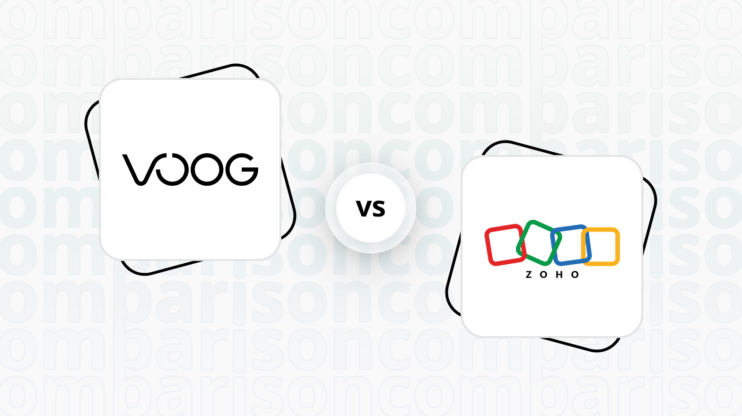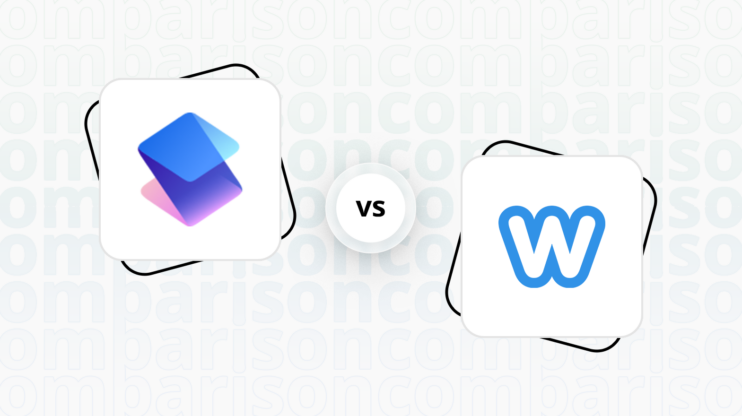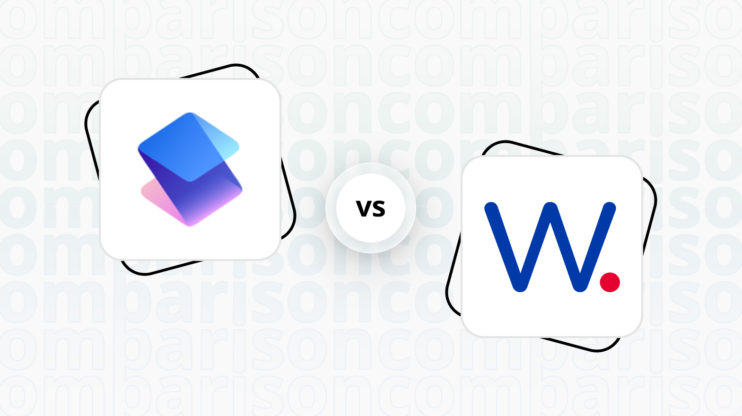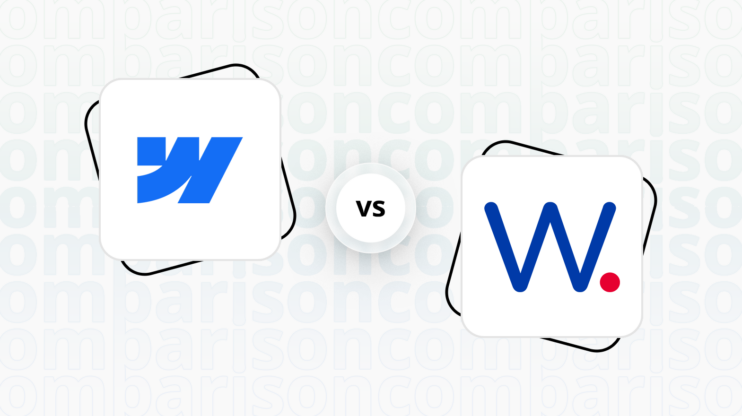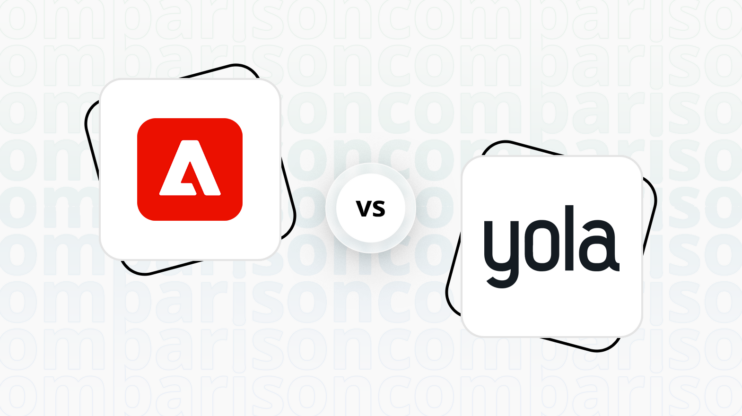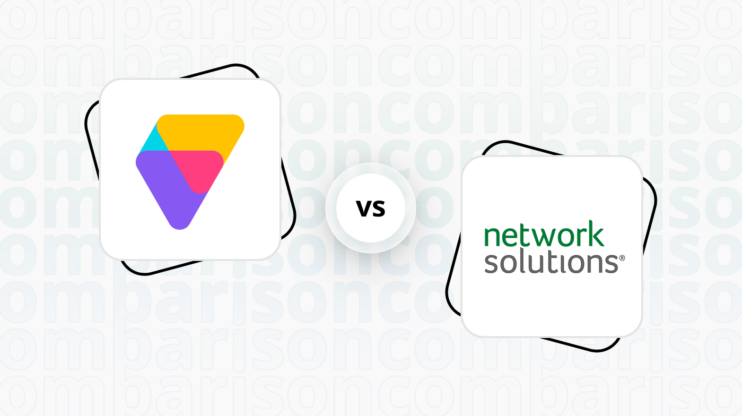Final verdict
Squarespace and Webnode both offer user-friendly website building experiences, but they cater to different needs and preferences.
-
Squarespace (Overall Grade: 7.9/10)
is a powerful website builder known for its professional templates and comprehensive design functionalities. It excels in providing a seamless user experience with its drag-and-drop editor, extensive learning resources, and robust ecommerce features. Squarespace is ideal for users seeking a hassle-free website creation experience with advanced design capabilities and strong marketing tools. -
Webnode (Overall Grade: 6.5/10)
is a good option for beginners who want to create a simple website quickly and easily. It offers a drag-and-drop interface and a variety of customizable templates, making it accessible for users without coding knowledge. While Webnode provides essential features and budget-friendly plans, it may fall short for users seeking extensive customization and advanced ecommerce functionalities.

|

|
|
|---|---|---|
|
Design functionalities & templates |
8.0 |
7.1 |
|
Ease of use |
8.3 |
8.0 |
|
Ecommerce |
8.2 |
6.3 |
|
Website Editors |
8.3 |
7.3 |
|
Product testing options |
7.4 |
5.3 |
|
Price |
8.4 |
7.7 |
|
Hosting quality |
7.6 |
6.3 |
|
Website speed optimization |
6.7 |
6.1 |
|
Plugins and integrations |
6.8 |
6.8 |
|
Marketing features |
8.1 |
5.5 |
|
Customer support |
7.8 |
5.3 |
|
Security |
8.8 |
7.7 |
|
AI capabilities |
7.5 |
5.3 |
|
User Management |
7.4 |
6.9 |
Best for ecommerce
 8.2
8.2
 6.3
6.3
Verdict
: Squarespace is better suited for businesses seeking a robust and comprehensive ecommerce solution, while Webnode is ideal for smaller businesses or beginners due to its simplicity and ease of use.
-
Squarespace
: Squarespace offers a user-friendly interface and comprehensive ecommerce features, making it suitable for businesses looking for a robust online store. It provides secure payment processing, built-in marketing tools, SEO optimization, and website analytics. With a diverse selection of around 50 ecommerce templates, Squarespace caters to various industries and enhances visual interest and engagement. Its extensive customization options for product pages and flexible payment processing make it a powerful option for those seeking a hassle-free website creation experience. Best For Ecommerce score: 8.2. -
Webnode
: Webnode is more suited for smaller businesses or beginners due to its simplicity and ease of use. It offers ecommerce-specific templates designed for creating online stores, with features such as product showcasing, shopping cart functionality, and support for various payment gateways. Webnode provides extensive customization options for product pages, allowing for visually appealing and informative displays. While it supports various payment gateways and doesn’t charge commissions on transactions, it primarily focuses on facilitating online transactions and doesn’t provide native POS capabilities. Best For Ecommerce score: 6.3.
Best for informational & business websites
 8.4
8.4
 7.2
7.2
Verdict
: Squarespace is the superior choice for creating informational business websites, offering a more comprehensive and flexible design experience, better ease of use, and superior hosting quality.
-
Squarespace
: With a score of 8.4, Squarespace excels in providing a user-friendly platform with extensive design functionalities and templates. It offers a seamless drag-and-drop editor, comprehensive learning resources, and robust hosting quality. Squarespace’s focus on security and customer support further enhances its appeal for businesses looking to create professional and secure informational websites. -
Webnode
: Scoring 7.2, Webnode is a good option for beginners who want to create a simple website quickly and easily. It offers a user-friendly drag-and-drop interface and customizable templates. However, it falls short in terms of extensive customization, hosting quality, and security features compared to Squarespace. Webnode is suitable for those on a budget or with simpler website needs.
Detailed comparison
Design functionalities & templates
Design FunctionalitiesRepresents how well each platform allows for creative design and customization of websites.Score Components:
- Template Variety (30%): Range and quality of design templates.
- Customization (30%): Flexibility and options for design alterations.
- User Interface (20%): Ease and intuitiveness of the design process.
- Responsiveness (10%): Adaptability to different devices and screen sizes.
- Innovation (10%): Unique design features and tools.
 8.0
8.0
 7.1
7.1
🏆
Winner: Squarespace.
Squarespace offers a more comprehensive and flexible design experience, making it the preferred choice for users seeking advanced design capabilities.
Squarespace boasts an impressive variety of website templates, offering over 120 pre-designed options to choose from. These templates cater to a wide range of needs and industries, from creative portfolios and sleek online stores to professional business websites and personal blogs.


Webnode offers a variety of website templates designed for different purposes, from business and portfolios to restaurants and travel. These templates are customizable and responsive, ensuring they display well on any device. While an exact number isn’t available, Webnode provides a wide selection to cater to diverse website needs.
Get a head start on website creation with AI
Create a custom website tailored to your business needs 10X faster with 10Web AI Website Builder!
Ease of use
Ease of useReflects the platform’s overall user-friendliness.Score
Components:
- Learning curve (40%): Quickness and ease of getting started.
- Interface design (30%): Simplicity and intuitiveness of layout.
- User guidance (20%): Quality of tutorials and support.
- Flexibility (10%): Adaptability to various user skills.
 8.3
8.3
 8.0
8.0
🏆 Winner: Squarespace
. With an ease of use score of 8.3, Squarespace slightly edges out Webnode, which scores 8.0. Squarespace is praised for its drag-and-drop editor, straightforward navigation, and real-time preview, making it a user-friendly option for a wide range of users. Webnode also offers a user-friendly experience with its drag-and-drop functionality and pre-designed templates, but it may fall short for users seeking extensive customization.
Learning Resources
🏆 Winner: Squarespace
. Squarespace provides extensive and high-quality learning resources, including a comprehensive Help Center, video tutorials, live webinars, and an active community forum. Webnode also offers a variety of learning resources, but the quality and accessibility may vary.
For ecommerce
EcommerceMeasures the platform’s effectiveness in supporting online business activities.Score Components:
- Ecommerce themes and templates (20%): Variety and design of templates.
- Product management (25%): Ease of managing and organizing products.
- Payment options (25%): Variety and convenience of payment methods.
- Ecommerce features (20%): Features for managing an ecommerce store.
- Integration (10%): Compatibility with external e-commerce tools and services.
 8.2
8.2
 6.3
6.3
Squarespace and Webnode both offer ecommerce solutions, but they cater to different needs and business sizes. Squarespace is known for its user-friendly interface and comprehensive ecommerce features, making it suitable for businesses looking for a robust online store. Webnode, on the other hand, is more suited for smaller businesses or beginners due to its simplicity and ease of use.

|

|
|
|---|---|---|
|
Ecommerce themes and templates |
7.5 |
6.5 |
|
Product page customization |
7.0 |
7.0 |
|
Payment processing and commissions |
7.8 |
6.8 |
|
POS capabilities |
6.5 |
4.0 |
|
Payment gateways |
7.5 |
7.0 |
|
Product numbers |
6.8 |
5.5 |
|
Additional ecommerce features |
7.2 |
6.0 |
Squarespace ecommerce features:
- Intuitive interface
- Secure payment processing
- Built-in marketing tools
- SEO optimization
- Website analytics
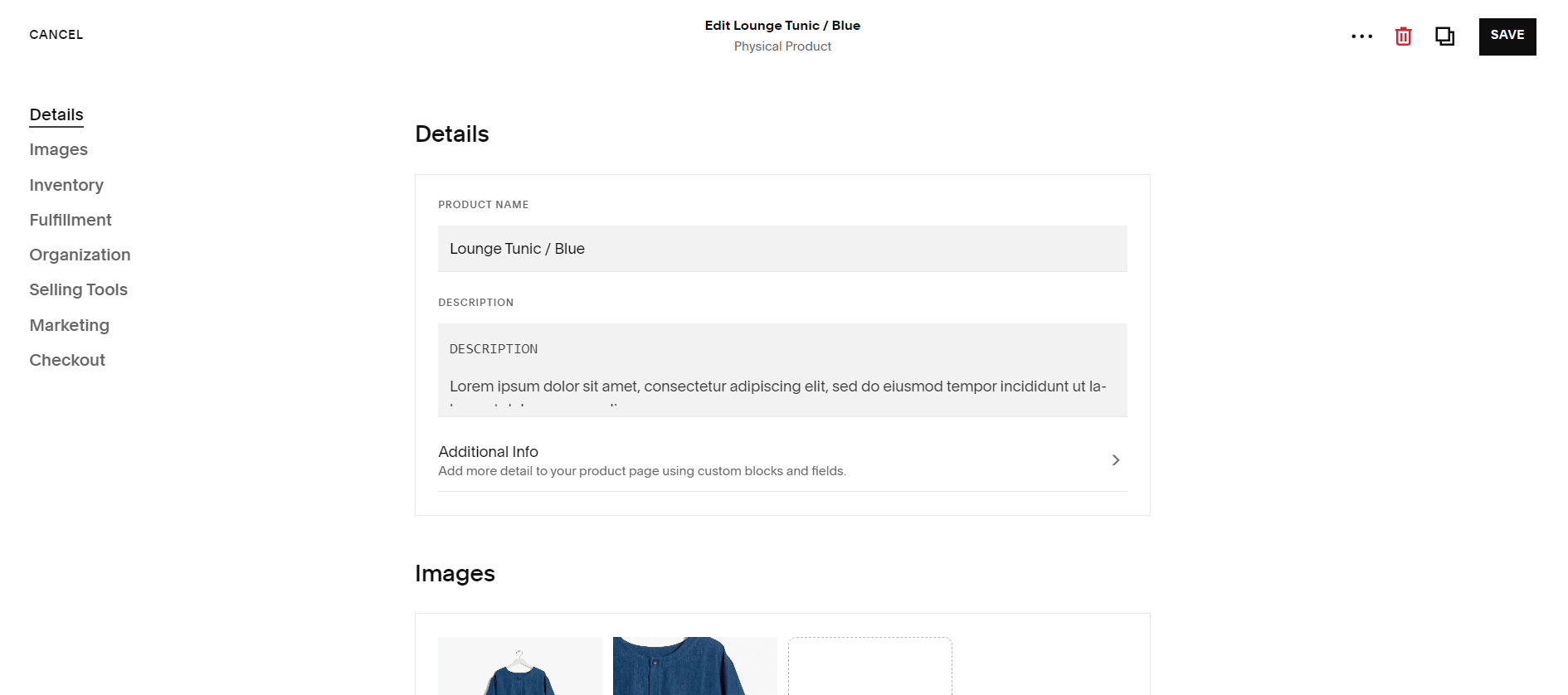
Webnode ecommerce features:
- Shipping options
- Payment gateway integrations
- Order management
- Coupons and discounts
Ecommerce themes & templates
Squarespace provides a diverse selection of around 50 ecommerce templates, catering to various industries like fashion, beauty, home goods, and technology. These templates range from clean and minimalist to bold and colorful, accommodating different brand aesthetics and product types. Offering unique layout elements such as product sliders and featured collections, these templates enhance visual interest and engagement.
Webnode offers ecommerce-specific templates designed for creating online stores, though the exact number of templates available may vary over time. These templates typically come with features such as product showcasing, shopping cart functionality, support for various payment gateways, and customization options. However, users should be mindful of potential limitations such as customization restrictions, feature limitations based on plan tiers, transaction fees, and integration limitations when choosing a template and plan for their ecommerce website on Webnode.
Product page customization
Squarespace allows for extensive customization of product pages, offering options for layout, design, and interactive elements. Users can choose templates, customize colors, fonts, and content, and enhance engagement with features like customizable buttons, wishlists, comparisons, reviews, and related products. Advanced options include custom code injection and third-party app integrations. However, limitations include fixed core page structure and the need for technical expertise. Free templates have fewer customization options than premium ones.
Webnode provides users with extensive customization options for product pages, allowing for the creation of visually appealing and informative displays. Through customizable content blocks, product images and galleries, and tailored product descriptions, users can effectively showcase their products. Additionally, features such as customizable call-to-action buttons, product variations, and SEO optimization contribute to a seamless and optimized shopping experience.
Payment processing
Squarespace provides flexible payment processing for online stores with integrated gateways like Stripe and PayPal. External gateways can be set up for specific needs. Transaction fees may apply depending on the plan and payment method. Security measures include PCI compliance and fraud prevention. Additional features include payment links, support for subscriptions, and the ability to accept international payments in various currencies.
Webnode supports various payment gateways, including popular options like PayPal and Stripe, for online transactions. While Webnode itself doesn’t charge commissions on transactions, payment gateways may have their own fee structures. Webnode primarily focuses on facilitating online transactions and doesn’t provide native POS capabilities, although integration with third-party POS solutions may be possible. For the latest information on supported payment gateways, transaction fees, and POS integrations, users should refer to Webnode’s official documentation or contact their customer support.
Website Editors
Website EditorsEvaluates the platforms’ website building and editing capabilities.Score Components:
- Customization tools (40%): Range and power of editing features.
- Editor usability (30%): User experience within the editor.
- Design flexibility (20%): Freedom in layout and design changes.
- Update and maintenance ease (10%): Simplicity of updating and maintaining the site.
 8.3
8.3
 7.3
7.3
🏆
Winner: Squarespace
. Squarespace, with a score of 8.3, offers a user-friendly editor that allows easy drag-and-drop website creation without coding. With visually appealing templates and customization options, it caters to beginners and pros alike. The real-time editing experience ensures instant previews. Prioritizing content, it’s mobile-responsive and offers functional features like forms, social media integration, and online stores. Squarespace seamlessly integrates with tools for extended capabilities.
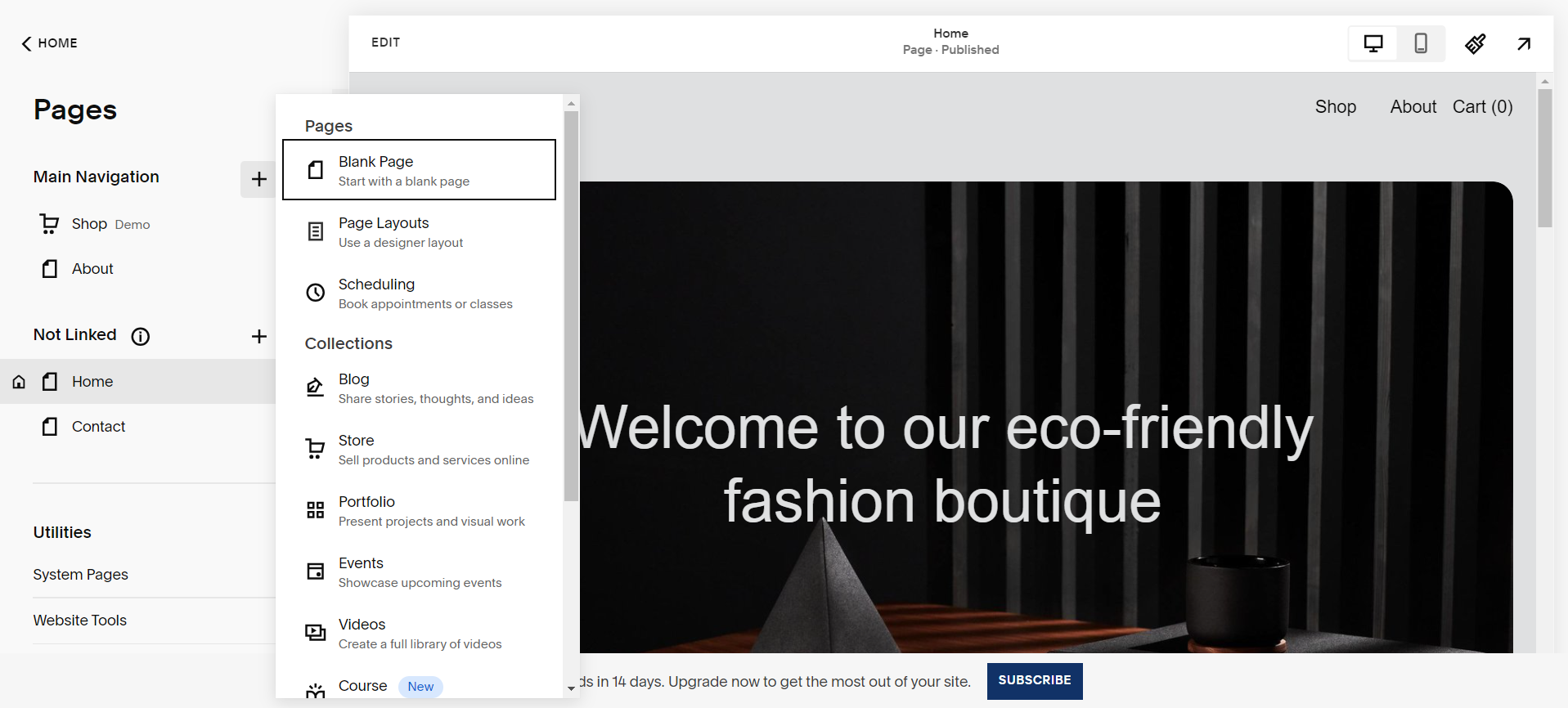
Webnode’s editor, scoring 7.3, features a user-friendly drag-and-drop interface with customizable templates, enabling users to easily create professional-looking websites without coding skills. The editor offers responsive design capabilities and multilingual support, catering to diverse audiences across different devices and languages. Built-in features such as SEO tools, e-commerce functionality, and analytics integration empower users to optimize their websites for search engines, sell products online, and track performance metrics effectively. Overall, Webnode provides a comprehensive solution for individuals and businesses to create and manage their online presence efficiently.
Mobile editor/app
 8.5
8.5
 5.5
5.5
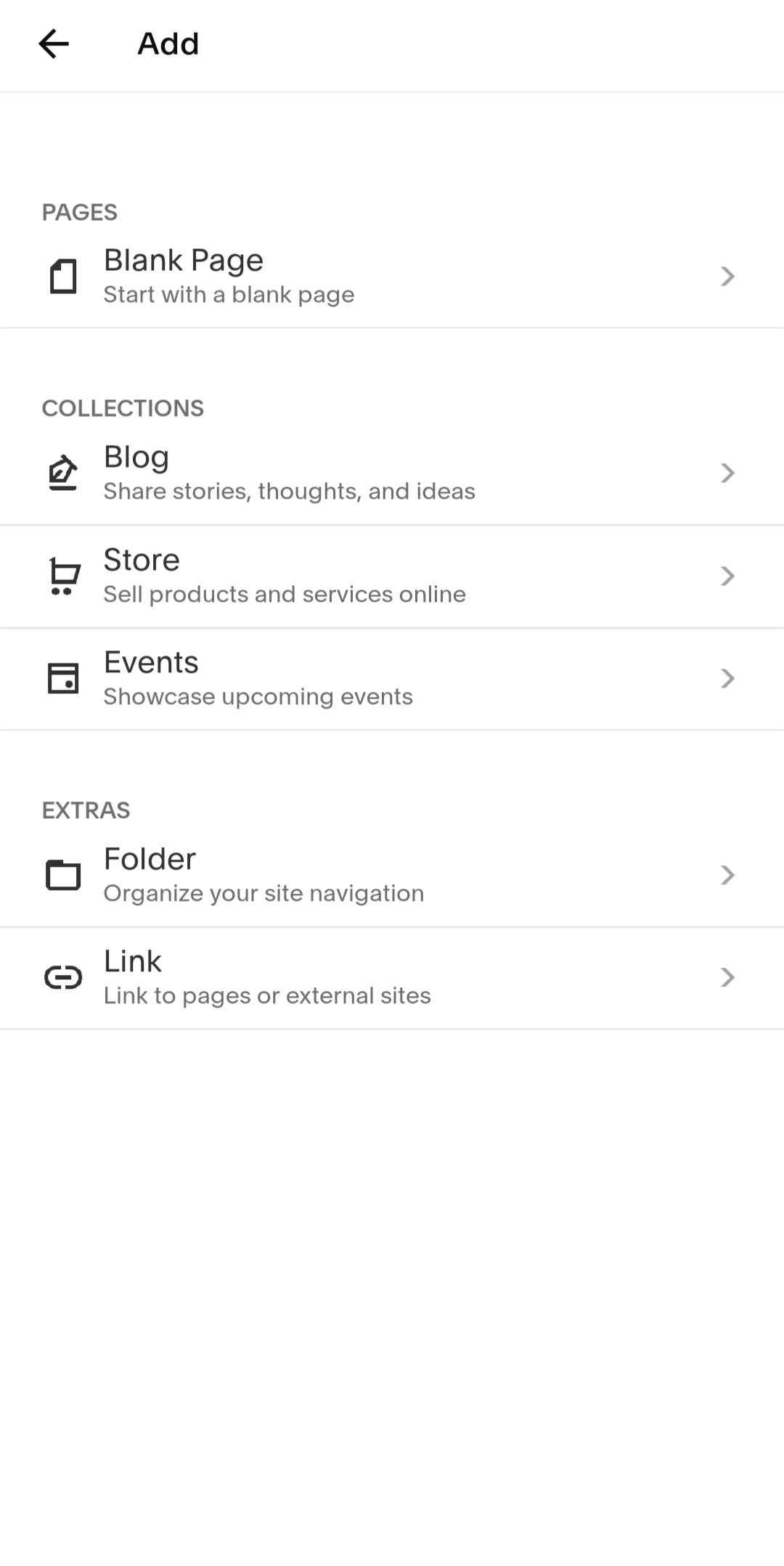

🏆
Winner: Squarespace
. Squarespace and Webnode both offer mobile editing capabilities, but they differ significantly in their approach and effectiveness. Squarespace provides a dedicated mobile app that allows users to manage their website on the go. The app supports content editing, website analytics, online store management, and social media scheduling. However, for more complex tasks like advanced design customization or creating new page layouts, users need to access the desktop editor.
Webnode, on the other hand, does not have a dedicated mobile app. Users can edit their website using the mobile browser version of the editor, but this comes with certain limitations. The lack of a dedicated app and the constraints of the mobile browser editor make it less convenient for users who need to make frequent updates or manage their site extensively from a mobile device.
In summary, Squarespace receives a higher rating due to its dedicated mobile app and broader range of mobile management features, while Webnode’s mobile editing capabilities are more limited and less user-friendly.
Product testing options
Product Testing OptionsAssesses the options for trying out platform features before commitment.Score Components:
- Trial quality (40%): Extent and usefulness of the trial or free version.
- Feature accessibility (30%): How many features are available to test.
- Trial duration (20%): Length of the trial period.
- Ease of transition (10%): Smoothness of moving from trial to paid plans.
 7.4
7.4
 5.3
5.3
Overall Result
:
Squarespace wins
. Squarespace scores 7.4, offering a more comprehensive trial experience compared to Webnode’s score of 5.3. Squarespace provides a 14-day free trial with access to most premium features, making it easier for users to evaluate the platform thoroughly. Webnode, while offering a free plan, has limitations on storage and features, and does not provide a trial version for its premium plans.

|

|
|
|---|---|---|
|
Free Plan |
No |
Yes |
|
Trial Duration |
14 days |
No |
|
Testing Premium Features |
Most of the premium features |
Some features can be tested with the free plan |
|
Money Back Guarantee |
Full refund within 14 days |
15-day money back guarantee |
Price
PriceLooks at the cost-effectiveness and value for money of each platform.Score Components:
- Plan value (40%): What each pricing tier offers.
- Transparency and clarity (30%): Clearness of pricing structures.
- Flexibility of plans (20%): Range of options to suit different budgets.
- Hidden costs (10%): Additional expenses not included in the plan.
 8.4
8.4
 7.7
7.7
Squarespace offers a range of plans with discounts for annual billing, while Webnode provides more budget-friendly options but lacks an enterprise plan.

|

|
|
|---|---|---|
|
$0-$10 |
No offering at this amount. |
LIMITED ($5.50/month): Basic plan, 200 MB storage, attach domain, website statistics, up to 5 form fields, last 30 days backup. This plan allows to manage 1 website with unlimited number of pages. Value for Price: 3.0 |
|
$10-$15 |
Personal ($12/month): Build a basic website with limited features for personal use. Access to basic templates, mobile-friendly design, and some social media integrations. Value for Price: 6.0 |
MINI ($10.00/month): All essentials for a simple website, 1 GB storage, 3 GB bandwidth, website statistics, 1 email account. This plan allows to manage 1 website with unlimited number of pages. Value for Price: 4.5 |
|
$15-$20 |
Business ($16/month): Upgrade features with custom domain, SEO tools, marketing tools like email campaigns, and analytics. Value for Price: 7.5 |
STANDARD ($16.90/month): For starting an online store, 3 GB storage, 10 GB bandwidth, 20 email accounts, basic store features. This plan allows to manage 1 website with unlimited number of pages. Value for Price: 6.0 |
|
$20-$30 |
Commerce ($26/month): Perfect for online stores with built-in eCommerce functionality (unlimited products), secure checkout, inventory management, and marketing tools. Value for Price: 8.5 |
PROFI ($26.50/month): Professional websites, 7 GB storage, unlimited bandwidth, 100 email accounts, full online store capabilities. This plan allows to manage 1 website with unlimited number of pages. Value for Price: 7.5 |
|
$30+ |
Advanced Commerce ($40/month): Cater to high-volume stores with advanced eCommerce features like abandoned cart recovery, product subscriptions, gift cards, and real-time shipping quotes. Value for Price: 9.0 |
BUSINESS ($34.90/month): Comprehensive e-commerce, 15 GB storage, unlimited bandwidth, 1000 email accounts, advanced online store features. This plan allows to manage 1 website with unlimited number of pages. Value for Price: 8.5 |
location. As a result in rare cases the prices displayed here can differ from the ones you see on their
websites.
Hosting quality
Hosting
qualityExamines the reliability and performance of the hosting solutions.Score Components:
- Uptime (40%): Consistency and reliability of website availability.
- Speed (30%): Loading times and performance.
- Bandwidth and storage (20%): Sufficiency of resources provided.
- Data centers (10%): Quality and distribution of hosting infrastructure.
 7.6
7.6
 6.3
6.3
🏆
Winner: Squarespace
Squarespace offers proprietary cloud-based hosting with a 99.9% uptime guarantee and strategically located data centers across North America, Europe, and Asia. Webnode, while providing hosting with bandwidth options and automated backups, does not disclose its hosting type or data center locations, and has a lower uptime of 99.6% without a guarantee. Squarespace’s transparency and reliability make it the better choice for hosting quality.

|

|
|
|---|---|---|
|
Do they offer hosting? |
Yes, included in all plans |
Yes, with from 1GB to unlimited bandwidth and automated backups on higher plans |
|
Data Centers: |
Squarespace’s data centers are strategically scattered across North America, Europe, and Asia |
Webnode does not disclose the locations of its data centers |
|
Type of hosting: |
Proprietary cloud-based hosting |
Webnode does not disclose its hosting type |
|
Uptime: |
99.9% |
99.6% |
|
Uptime Guarantee: |
Yes, 99.9% |
No |
Website Speed Optimization
Website Speed OptimizationEvaluates optimization of website loading timesScore Components:
- PageSpeed Score (30%): Google’s score indicating performance optimization.
- Loading Time (30%): The average time until a website is fully interactive.
- Mobile Optimization (15%): Optimization effectiveness for mobile devices.
- Resource Optimization (15%): Optimizing images, scripts, and other heavy resources.
- CDN Usage (10%): Use of CDN to enhance speed across geolocations.
 6.7
6.7
 6.1
6.1
🏆 Winner: Squarespace
Both Squarespace and Webnode offer various strategies for optimizing website speed, but Squarespace has a slight edge due to its comprehensive approach and better performance metrics.

|

|
|
|---|---|---|
|
Focus |
Responsive design, image optimization, CDN, code minification, lazy loading of images |
Code Minification, Image Optimization, Caching |
|
Performance Tools |
Google PageSpeed Insights |
Google PageSpeed Insights |
|
Key Strategies |
Responsive design, image optimization, CDN, code minification, lazy loading of images |
Code Minification, Image Optimization, Caching |
|
Load Times |
0.7s to 9.1s (Average: 2.9s) |
Varies depending on optimization |
|
Page Speed Scores Range |
20/100 to 93/100 (Average: 62.7/100) |
Varies depending on optimization |
|
Core Web Vitals Improvement |
Emphasis on LCP, FID, CLS improvements |
No information provided |
Squarespace employs a range of strategies to optimize website speed, including responsive design, image optimization, CDN, code minification, and lazy loading of images. These strategies help ensure that websites load quickly and efficiently. Squarespace’s load times range from 0.7 seconds to 9.1 seconds, with an average of 2.9 seconds. Page speed scores for Squarespace range from 20/100 to 93/100, with an average of 62.7/100. Additionally, Squarespace places an emphasis on improving Core Web Vitals, specifically focusing on LCP (Largest Contentful Paint), FID (First Input Delay), and CLS (Cumulative Layout Shift).
Webnode also offers several strategies for speed optimization, including code minification, image optimization, and caching. However, Webnode does not provide specific information on load times, PageSpeed scores, or Core Web Vitals improvements. This lack of detailed performance metrics makes it difficult to fully assess Webnode’s effectiveness in optimizing website speed. While Webnode’s strategies are beneficial, the absence of comprehensive performance data and Core Web Vitals improvements gives Squarespace an advantage in this comparison.
Get a head start on website creation with AI
Create a custom website tailored to your business needs 10X faster with 10Web AI Website Builder!
Plugins and integrations
Plugins and integrationsMeasures the range and effectiveness of additional plugins and integrations.Score Components:
- Variety of options (40%): Range of available add-ons.
- Integration smoothness (30%): Ease of integrating plugins into the site.
- Quality of plugins (20%): Functionality and reliability of the options.
- Custom integration capabilities (10%): Support for custom or third-party integrations.
 6.8
6.8
 6.8
6.8
🏆 Winner: Tie.
Both Squarespace and Webnode score 6.8 in this category, indicating that they offer comparable capabilities when it comes to plugins and integrations.
Squarespace supports over 20 official partner integrations and a variety of third-party tools through custom code injection, covering areas like analytics, marketing, commerce, and social media. Webnode, on the other hand, offers over 70 plugins developed by Elfsight, enhancing functionalities such as social media integration, e-commerce, and user engagement.
While Squarespace provides seamless integration with popular tools like Mailchimp, Google Analytics, and Stripe, Webnode’s Elfsight plugins offer a wide range of utilities, including social media feeds, review widgets, and chat services. Both platforms provide a mix of free and premium options, allowing users to tailor their websites according to their needs and goals.
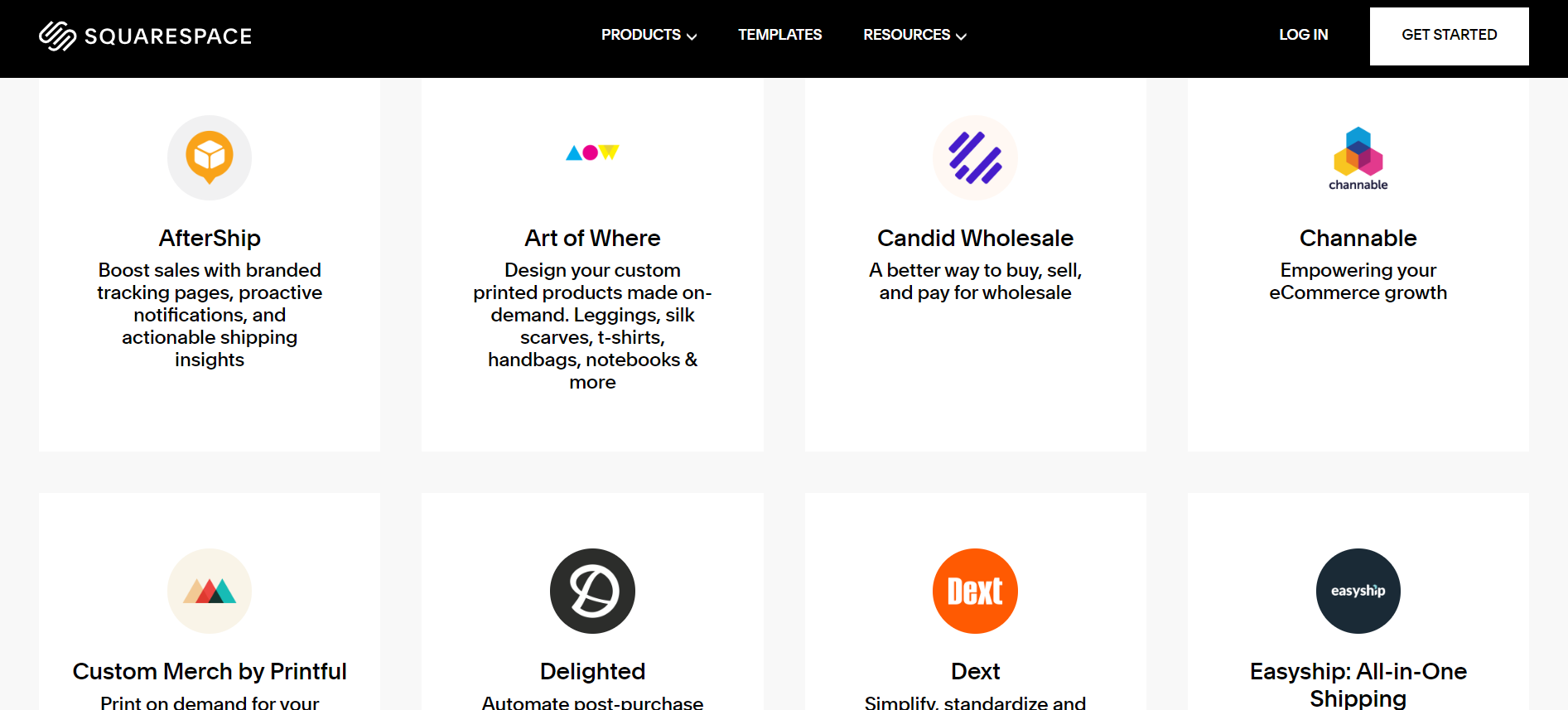

Marketing Features
Design FunctionalitiesRepresents how well each platform allows for creative design and customization of websites.Score Components:
- Template Variety (30%): Range and quality of design templates.
- Customization (30%): Flexibility and options for design alterations.
- User Interface (20%): Ease and intuitiveness of the design process.
- Responsiveness (10%): Adaptability to different devices and screen sizes.
- Innovation (10%): Unique design features and tools.
 8.1
8.1
 5.5
5.5
🏆
Overall Winner: Squarespace
. Squarespace excels with its comprehensive marketing tools, especially in SEO, email marketing, and analytics. Webnode, while user-friendly, offers more basic marketing features suitable for simpler websites.

|

|
|
|---|---|---|
|
SEO Tools |
✓ |
✓ |
|
Email Marketing |
✓ |
✓ |
|
Blogging |
✓ |
✓ |
|
Social Media Integration |
Direct linking and selling on social platforms, plus feed displays on-site |
User-friendly integration with major social media platforms |
|
Analytics and Reporting |
Detailed insights into website performance and visitor behavior |
Integration with external tools like Google Analytics |
|
Ads and Promotions |
Integration with Google Ads and tools for managing sophisticated ad campaigns |
Built-in SEO tools, Google AdSense, and Ads.txt integration |
Marketing Features Score
: Squarespace: 8.1, Webnode: 5.5
Customer Support
Customer supportEvaluates the quality and availability of support options.Score Components:
- Response time (40%): Speed of support responses.
- Support quality (30%): Effectiveness and helpfulness of the support.
- Availability (20%): Range of support channels (phone, chat, email).
- Resource richness (10%): Quality of self-help and educational materials.
 7.8
7.8
 5.3
5.3
🏆 Winner: Squarespace
. In the comparison of Squarespace vs Webnode, Squarespace takes the lead with a customer support score of 7.8. Squarespace offers a variety of support options, including live chat, email, a community forum, and a comprehensive help center. Live chat and phone support are available on weekdays from 6 AM to 6 PM PST, while email support is available 24/7. The community forum and help center provide 24/7 access, ensuring users can find help whenever they need it.
Webnode, on the other hand, has a customer support score of 5.3. It offers support in more than 20 languages and is available five days a week. Email support is the primary channel for all users, with premium customers receiving priority phone support. However, phone and live chat support are not generally available, and email support operates only during weekdays with an estimated 24-hour turnaround time for responses. This makes Webnode less accessible compared to Squarespace, especially for users needing immediate assistance.
Security
SecurityLooks at the platforms’ security measures and data protection.Score Components:
- Data protection (40%): Safeguards for user and customer data.
- SSL and encryption (30%): Implementation of secure connections.
- Compliance (20%): Adherence to industry security standards.
- Regular updates (10%): Frequency of security updates and patches.
 8.8
8.8
 7.7
7.7
🏆
Winner: Squarespace
. Squarespace excels in security with a comprehensive suite of features including SSL certificates, vulnerability scanning, malware detection, and compliance with regulations like GDPR and PCI-DSS. These measures ensure that both website content and customer information are well-protected, making it a reliable choice for users who prioritize security.
Webnode, while offering essential security features such as HTTPS, IP Filters, and GDPR compliance tools, does not match the extensive security measures provided by Squarespace. However, it remains a solid option for users seeking basic security for their websites, especially those on a budget or with simpler security needs.
AI Capabilities
AI capabilitiesMeasures the effectiveness of AI-driven features and tools.Score Components:
- Automation efficiency (40%): Impact of AI on streamlining processes.
- Personalization (30%): AI-driven customization for users or customers.
- AI-Assisted design (20%): Role of AI in website design and functionality.
- Data analysis (10%): Use of AI in interpreting user data and analytics.
 7.5
7.5
 5.3
5.3

|

|
|
|---|---|---|
|
AI Builder |
AI-powered features to assist with website creation |
AI builder generates custom websites based on user inputs |
|
AI Ecommerce Features |
AI-powered copywriting, SEO optimization, and email marketing |
|
|
AI Content Generation |
Generates product descriptions, blog posts, and social media |
|
|
Additional AI Features |
SEO suggestions, related product recommendations, and more |
|
🏆 Winner: Squarespace
. Squarespace, with a score of 7.5, offers a robust set of AI tools that enhance various aspects of website creation and management. Its AI capabilities include content generation, SEO optimization, and personalized marketing insights, making it a powerful option for users looking to streamline their website building process.

Webnode, with a score of 5.3, provides a basic AI builder that helps users create custom websites based on their inputs. However, it lacks the advanced AI features found in Squarespace, such as AI-powered content generation and eCommerce tools.
User Management
User ManagementAssesses the platforms’ capabilities in managing user roles, permissions, and accessibility.Score Components:
- Role Customization (40%): Flexibility in creating and defining user roles and
permissions. - Ease of Management (30%): User interface and tools for managing users.
- Access Control (20%): Effectiveness of access control measures for different user
levels. - Scalability (10%): Ability to manage a growing number of users efficiently.
 7.4
7.4
 6.9
6.9
🏆 Winner: Squarespace
. Managing your online team with Squarespace and Webnode involves different approaches to website editing access.
- Squarespace allows the number of users with editing access to vary by plan. The Personal Plan allows one owner, Business and Commerce Plans permit 2 collaborators with different access levels, and the Enterprise Plan offers unlimited users, each with customizable access privileges, from full administrators to restricted contributors.
- Webnode allows multiple users to manage and edit a website, but the exact number varies depending on the subscription plan you choose. Generally, the free version of Webnode provides limited user access for management and editing, while premium plans offer more flexibility, including the ability to add multiple users with different roles and permissions.
Both platforms support simultaneous editing, but the flexibility and customization of user roles in Squarespace make it a more robust option for larger teams.
Squarespace User Roles and Access Levels:
| Role | Description | Access Highlights |
|---|---|---|
| Owner | The primary user who created the website and has full access. | Full site access, including billing, site settings, content editing, and member management. |
| Administrator | Users granted nearly full access to manage the site alongside the Owner. | Access to most areas except for some owner-specific settings like ownership transfer. |
| Content Editor | Users focused on adding and managing site content without full site access. | Can add, edit, and delete content on pages, blog posts, and manage comments. |
| Billing | Users who manage the subscription and billing details. | Access to billing information and the ability to update subscription details. |
| Store Manager | Users who manage the ecommerce aspects of the site. | Can manage inventory, fulfill orders, manage customers, and view sales analytics. |
| Custom | A role defined by the site owner or administrators with specific access. | Customizable access as defined by the Owner or Administrators, can vary widely between sites. |
Webnode User Roles and Access Levels:
| Role | Description | Access Highlights |
|---|---|---|
| Website Owner | The individual or entity that owns the Webnode website. | Full access: can modify site structure, design, content, and manage user roles. |
| Administrator | Users with administrative privileges assigned by the website owner. | Nearly full access, including content management, and some settings adjustments. |
| Editor | Users tasked with creating, editing, and publishing content. | Access to add and edit content, blog posts, and pages, but cannot alter design. |
| Contributor | Users who can contribute content but cannot publish it. | Can draft content but need approval from an Editor or Administrator to publish. |
| Viewer/Visitor | Individuals who visit the website without any editing permissions. | Can view the public website and interact through comments or contact forms. |
| E-commerce Manager | Specifically for websites with an e-commerce component, managing products. | Can add, edit, and manage products, orders, and customer interactions. |
Additional Features

|

|
|
|---|---|---|
|
SSL Certificate |
✓ |
✓ |
|
Custom Domain |
✓ |
✓ |
|
Free Custom Domain Included |
✓ |
✓ |
|
International Domains |
✓ |
✓ |
|
Mobile Responsive |
✓ |
✓ |
|
Page Speed |
✓ |
✓ |
|
Website Builder Mobile App |
✓ |
X |
|
Convert a Website To An App |
X |
X |
|
Website Analytics |
✓ |
✓ |
|
Multilingual Sites |
✓ |
✓ |
|
Multiple Users |
✓ |
✓ |
User Feedback
Squarespace is well-liked for its easy-to-use interface and versatile tools, making it ideal for those who aren’t tech-savvy. It offers various features like website creation, SEO, online selling, and more, catering to different users. Customers appreciate its good customer support and visually appealing templates, creating a professional online presence. However, some users find issues with domain transfer/setup, limited customization options, and consider the pricing slightly higher. There are also occasional concerns about customer service and technical limitations like template rigidity and missing features.
User feedback on Webnode highlights its ease of use, rapid website creation capabilities, and the wide range of templates available, making it a popular choice for individuals and businesses seeking an intuitive web development platform. While praised for its user-friendly interface and quick setup, including domain purchase and application, some users express a desire for more flexibility and customization options, especially in themes and e-commerce features. Comparatively, it falls short on advanced functionalities such as SEO tools and widgets offered by competitors like WordPress. Customer service experiences vary, with some users facing challenges in getting support for email hosting and analytics integration. Overall, Webnode is celebrated for its ability to accommodate users with little to no coding knowledge, offering an accessible solution for creating professional websites, though it may not fully meet the needs of those requiring more complex site features or dedicated customer support.
The making of this blog
We followed a clear, step-by-step process to write and research this article.
FAQ
Which platform is easier to use for beginners?
Can I customize templates on both Squarespace and Webnode?
What are the pricing options like for Squarespace and Webnode?
Do Squarespace and Webnode both support ecommerce?
How do the website editors compare between Squarespace and Webnode?










